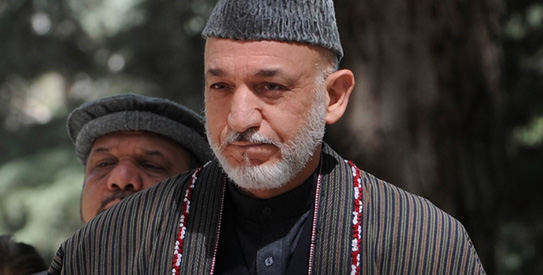
WASHINGTON: US officials support Afghan President Hamid Karzai’s call for engaging the Taliban through Pakistan, reported on Sunday amid speculations that Washington and Islamabad are once again warming up to each other after unprecedented tensions.
Instead of dealing with “shadow intermediaries”, Mr Karzai wants to pursue reconciliation “in a way that’s more focused with established interlocutors, which the government of Pakistan would be one. We welcome that”, a senior US official told the Post.
Diplomatic sources in Washington told Dawn that as the first concrete step towards engaging Pakistan, the United States was encouraging Afghanistan to convene a meeting of a joint peace commission, established in June.
If held, the meeting would enable Prime Minister Yousuf Raza Gilani and the heads of the Pakistani army and intelligence services to meet their Afghan counterparts and discuss all major issues.
The diplomatic sources pointed out that in an interview to an Afghan television channel on Sunday; US Special Representative Marc Grossman also underlined the need for Pakistan, Afghanistan and the United States to work together against terrorism.
“What we continue to talk about is the need for engagement between the United States and Pakistan. And if I might add, also the need for engagement between Pakistan and Afghanistan,” he said. After talks in Kabul, Mr Grossman is heading to Islamabad for further talks on this and other issues. The Washington Post noted that the Afghan president’s effort mirrored the US approach towards Pakistan: negotiating with the Taliban with Islamabad’s help while publicly chiding it for its contacts with the insurgents.
As Pakistan's ISI was busy brokering a recent meeting between US officials and the hardline Haqqani faction, the US military chief publicly accused it of using the group as its “veritable arm”.
Similarly, Mr Karzai, while seeking to engage Pakistan to negotiate with the Taliban, also accused Islamabad of fanning troubles in Afghanistan.
US experts, who spoke to various media outlets, said that behind this public criticism lay the cold realisation that there could be no peace in Afghanistan if Pakistan was kept out.
But a recent report by the government-funded US Institute of Peace (USIP) pointed out that the Pakistanis were not sure how the Americans wanted to shape the end-game in Afghanistan. “Pakistani elite believe that the US would continue to push the Pakistan military to `do more` to stamp out militant sanctuaries while it tries to open up direct channels for talks with the Taliban — with an eye on reducing reliance on Pakistan`s security establishment in the political reconciliation process,” the report noted.
Pakistanis appear particularly concerned about a strategic partnership agreement that President Karzai signed with India during his visit to New Delhi last week.
The Pakistanis fear that the agreement gives India a centre stage in the Afghan end-game and places it in a position to stir troubles in the bordering areas of Pakistan as well. But the USIP report noted that Pakistani policy-makers also faced a dilemma on the Afghan end-game.
They believed that “on the one hand, US military operations in Afghanistan are … causing an internal backlash in terms of militancy and deepening the state-society rift within Pakistan. On the other hand, Pakistani policy elite appreciate that a premature US troop withdrawal would lead to added instability in Afghanistan”, the report said.
“Pakistan has tried to balance these two competing aspects by providing significant counter-terrorism and strategic support to the US while also refusing to target the Afghan Taliban and other Pakistan-based groups operating in Afghanistan,” the report added.













































